Miss Nobody is a polonais film of genre Drama directed by Andrzej Wajda released in USA on 11 november 1996 with Anna Mucha
Miss Nobody (1996)
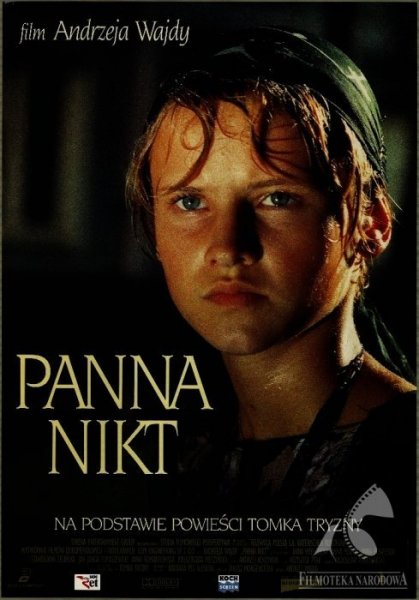
If you like this film, let us know!
Released in USA 11 november 1996
Length 1h38
Directed by Andrzej Wajda
OriginPologne
Genres Drama
Rating58%










Miss Nobody (Polish: Panna Nikt) is a 1996 Polish drama film directed by Andrzej Wajda. It was entered into the 47th Berlin International Film Festival where Anna Wielgucka won an Honourable Mention.
Actors

Anna Mucha
(Kasia Bogdanska)
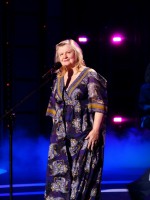
Stanisława Celińska
(Ewa)

Leszek Teleszyński
(Ewa's Father)

Małgorzata Pieczyńska
(Kasia's Mother)

Anna Romantowska
(Form Tutor)
Comments
Leave comment :
Suggestions of similar film to Miss Nobody
There are 7 films with the same actors, 38 films with the same director, 61578 with the same cinematographic genres, to have finally 70 suggestions of similar films.If you liked Miss Nobody, you will probably like those similar films :
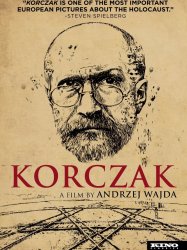
Korczak (1990)
, 1h55Directed by Andrzej Wajda
Origin Pologne
Genres Drama, War, Biography, Historical
Themes Films about religion, Political films, Films about Jews and Judaism
Actors Wojciech Pszoniak, Aleksander Bardini, Ewa Dałkowska, Anna Mucha, Agnieszka Krukówna, Teresa Budzisz-Krzyżanowska
Rating73%





Le film se passe pendant la Seconde Guerre mondiale, en 1942, dans le ghetto de Varsovie. Janusz Korczak a la charge de plusieurs centaines d'orphelins : il doit subvenir à leurs besoins dans des conditions très difficiles. On peut voir, par exemple, sur des photos d'époque prises dans ces orphelinats, que les enfants étaient pieds nus.
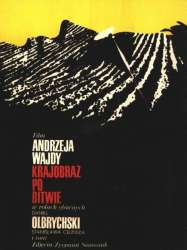
Landscape After Battle (1970)
, 1h41Directed by Andrzej Wajda
Origin Pologne
Genres Drama, War, Historical, Romance
Actors Daniel Olbrychski, Aleksander Bardini, Stanisława Celińska, Tadeusz Janczar, Zygmunt Malanowicz, Mieczysław Stoor
Rating69%





The Landscape After the Battle film tells a story of two young concentration camp survivors. A young Polish poet (Tadeusz) is asked by a pretty Jewish girl (Nina) to go with her to the West. His camp experience, however, prevents him from realizing the depth of her love for him, and he is reluctant to commit. The woman is accidentally shot dead by an American soldier, causing the poet to cry for the first time in years. The shock of her death brings back the world of feelings suppressed by his Nazi captors, and allows for his original creativity to reemerge.

The Maids of Wilko (1979)
, 1h58Directed by Andrzej Wajda
Origin Pologne
Genres Drama, Romance
Actors Daniel Olbrychski, Anna Seniuk, Maja Komorowska, Stanisława Celińska, Krystyna Zachwatowicz-Wajda, Christine Pascal
Rating73%





At the age of 40, Wiktor Ruben (Daniel Olbrychski) returns to the family property (Wilko) where he'd spent his late teens/early twenties as a tutor of young sisters. Now they are all women - mostly wives and mothers. Wiktor discovers that Fela, once the closest to him, is now dead for some time and other sisters aren't too keen to talk about her and her grave is rather forgotten. He is also disappointed with how all the women have changed. Julia (Anna Seniuk), now a mother of two, doesn't resemble his first object of love and desire she once was and doesn't show him an affection he might expected. Jola (Maja Komorowska), seemingly unhappy in her marriage, chases him and makes fun of it, until he doesn't bring the painful memories of the past. Kazia (Krystyna Zachwatowicz), a divorcee - thus treated like less worthy than others - is the most demanding partner of his intellectual reflections while Zosia (Stanisława Celińska) is - as always - distant and outspoken. That leaves him with Tunia (Christine Pascal) who was only a child when he previously knew her but now resembles Fela. Wiktor spends time in Wilko but isn't able to see that his return restored once forgotten dreams and hopes of the sisters.
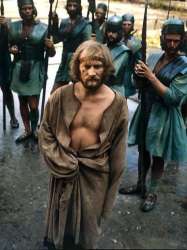
Pilate and Others (1972)
, 1h34Directed by Andrzej Wajda
Origin German
Genres Drama
Actors Wojciech Pszoniak, Daniel Olbrychski, Andrzej Łapicki, Marek Perepeczko, Jerzy Zelnik, Vladek Sheybal
Rating67%






The Wedding (1973)
, 1h42Directed by Andrzej Wajda
Origin Pologne
Genres Drama
Themes Théâtre, Films based on plays
Actors Daniel Olbrychski, Ewa Ziętek, Andrzej Łapicki, Wojciech Pszoniak, Franciszek Pieczka, Marek Perepeczko
Rating69%





A poet marries a peasant girl. Their wedding reception follows. The celebration of the new marriage moves on from the church to the villager's house. In the rooms adjoining that of the wedding party, guests continually burst into arguments, make love, or simply rest from their merriment, dancing and feasting. Interspersed with the real guests are the well-known figures of Polish history and culture, who represent the guilty consciences of the characters. The two groups gradually begin a series of dialogues. The Poet (played by Andrzej Łapicki) is visited successively by the Black Knight, a symbol of the nation's past military glory; the Journalist (played by Wojciech Pszoniak), then by the court jester and conservative political sage Stańczyk; and the Ghost of Wernyhora (Marek Walczewski), a paradigm of leadership for Poland. Wernyhora presents the Host with a golden horn symbolizing the national mission, and calls the Polish people to a revolt. One of the farm hands is dispatched to sound the horn at each corner of Poland, but he loses the horn soon after.
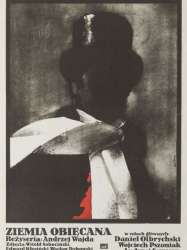
The Promised Land (1975)
, 2h59Directed by Andrzej Wajda
Origin Pologne
Genres Drama, Historical
Actors Daniel Olbrychski, Wojciech Pszoniak, Andrzej Seweryn, Anna Nehrebecka, Kalina Jędrusik, Franciszek Pieczka
Rating77%





Karol Borowiecki (Daniel Olbrychski), a young Polish nobleman, is the managing engineer at the Bucholz textile factory. He is ruthless in his career pursuits and unconcerned with the long tradition of his, now financially declined, family. He plans to set up his own factory with the help of his friends Max Baum (Andrzej Seweryn), a German and heir to an old handloom factory, and Moritz Welt (Wojciech Pszoniak), an independent Jewish businessman. Borowiecki's affair with Lucy Zucker (Kalina Jędrusik), wife of another textile magnate, gives him advance notice of a change in cotton tariffs and helps Welt to make a killing on the Hamburg futures market. But more money has to be found, so all three characters cast aside their pride to raise the necessary capital.
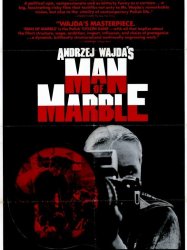
Man of Marble (1977)
, 2h40Directed by Andrzej Wajda
Origin Pologne
Genres Drama, Historical
Themes Political films
Actors Krystyna Janda, Jerzy Radziwiłowicz, Tadeusz Łomnicki, Krystyna Zachwatowicz-Wajda, Kazimierz Kaczor, Ewa Ziętek
Rating76%





Agnieszka, is a young filmmaker who is making her film thesis on Mateusz Birkut, a bricklayer elevated as a hero in a stunt to increase construction efficiency and brick quotas. However, who has since had a fall from grace of the Party and other officials. His current whereabouts seem to have been lost two decades later, and she attempts to piece together the details of his downfall. Agnieszka has difficulty making the film from archival sources and museum collections, but little work remains outside of official propaganda.

Without Anesthesia (1978)
, 2h11Directed by Andrzej Wajda
Origin Pologne
Genres Drama
Actors Zbigniew Zapasiewicz, Ewa Dałkowska, Andrzej Seweryn, Krystyna Janda, Kazimierz Kaczor, Jerzy Stuhr
Rating72%





Un célèbre journaliste polonais présente un problème pour les pouvoirs en place lorsqu'il affiche ses compétences et ses connaissances politiques dans une émission de télévision présentant des questions et réponses lors d'une conférence mondiale par un panel de journalistes. Ses ennemis lui enlèvent ses privilèges quand il est absent. Le choc d'être «indésirable» correspond à une déception plus profonde dans sa vie privée: sa femme a une liaison avec un jeune rival jaloux, et après 15 ans de mariage et deux filles veux divorcer.

The Conductor (1980)
, 1h41Directed by Andrzej Wajda
Origin Pologne
Genres Drama, Musical
Themes Films about music and musicians, Films about classical music and musicians
Actors John Gielgud, Krystyna Janda, Andrzej Seweryn, Maria Seweryn, Janusz Gajos
Rating68%





Une violoniste d'un orchestre provincial polonais, dont le mari est le directeur de l'ensemble, en visite aux États-Unis, se lie avec le chef d'orchestre symphonique de renommée mondiale. Il s'avère qu'il était autrefois amoureux de la mère de la violoniste

Man of Iron (1981)
, 2h20Directed by Andrzej Wajda
Origin Pologne
Genres Drama, Historical
Themes Films about the labor movement, Political films
Actors Jerzy Radziwiłowicz, Krystyna Janda, Bogusław Linda, Artur Barciś, Marian Opania, Andrzej Seweryn
Rating72%





The film is set in Gdansk in 1980. In Gdansk shipyard workers strike continues. Among them, an important role is played by activist Strike Committee, Maciek Tomczyk (played by Jerzy Radziwiłowicz). Radio journalist, editor Winkel (Marian Opania) is ordered by the deputy chairman of Radio Committee (Janusz Gajos) to achieve coverage compromising Tomczyk. Is sent to Gdansk, where a representative of the authorities Badecki (Franciszek Trzeciak) realizes the importance of his job.
 Connection
Connection